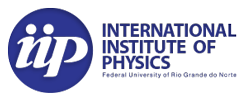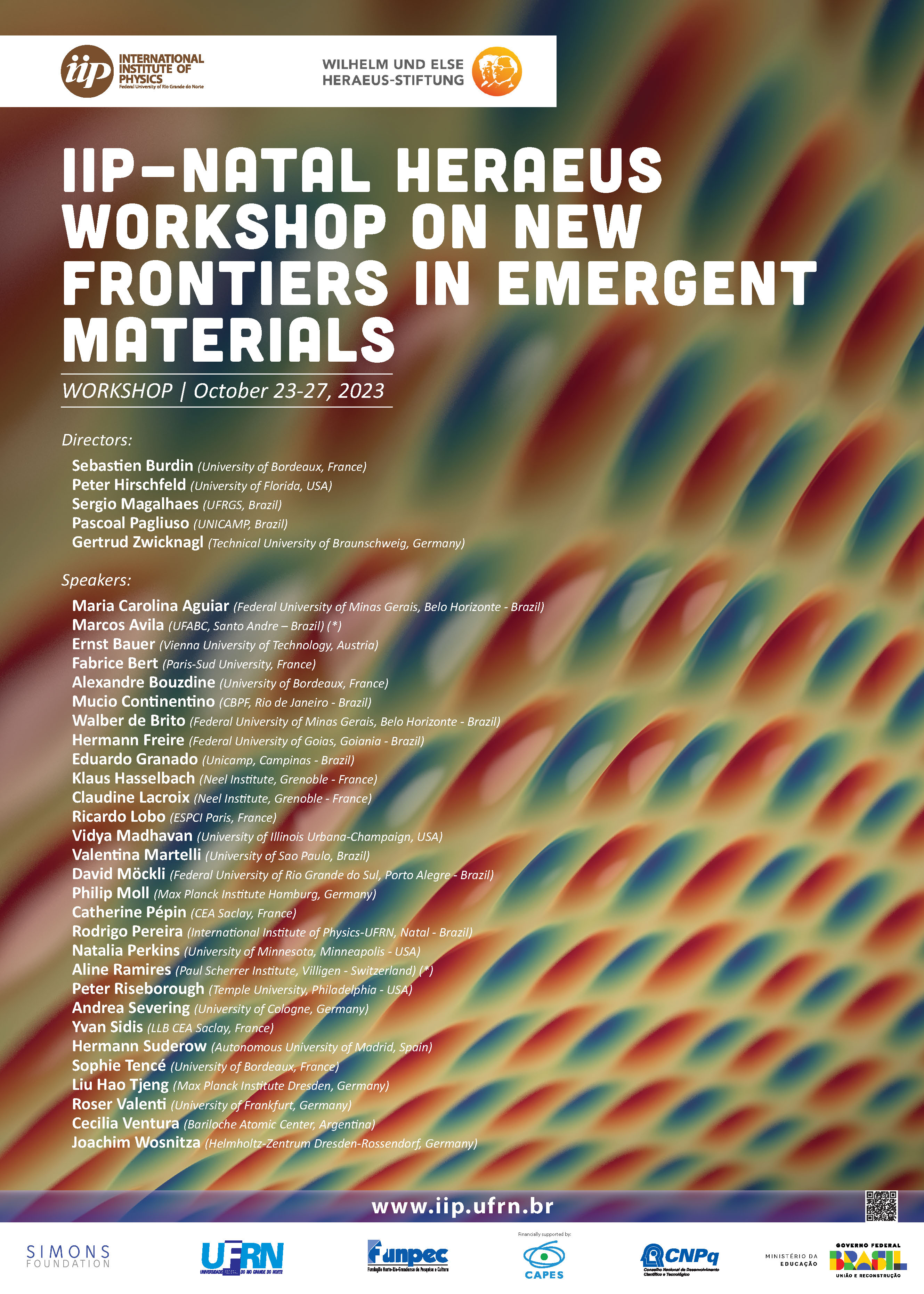Please be aware that the International Institute of Physics, IIP, never contacts the participants to ask for credit card or similar information. Participants are expected to pay for their travel and accommodation by themselves unless they qualify for financial support. If you have any questions, please contact IIP events department at events@iip.ufrn.br
IIP-Natal WE-Heraeus workshop on New Frontiers in Emergent Materials
DATES
October 23-27, 2023
DIRECTORS
- Sebastien Burdin (University of Bordeaux, France)
- Peter Hirschfeld (University of Florida, USA)
- Sergio Magalhaes (Federal University of Rio Grande do Sul, Brazil)
- Pascoal Pagliuso (University of Campinas, Brazil)
- Gertrud Zwicknagl (Technical University of Braunschweig, Germany)
OVERVIEW
Fermi surfaces and electronic band structures paradigm occupy a central place in solid state science, since most of the physical properties of bulk metallic materials are governed by conduction electrons. The underlying hypothesis, which relies on a Bloch wave description of crystalline non-interacting electronic systems, is obviously not satisfied in numerous examples of emergent materials. The most challenging examples include strongly correlated electronic systems and structurally disordered materials showing spectacular macroscopic properties related with unconventional quantum order. Despite the inapplicability of the most common approaches to calculating electronic structure, the notion of electronic bands may often be generalized to describe most of these emergent materials. A standard example of such extension, from a phenomenological point of view, is the Fermi Liquid description of strongly correlated systems: despite strong interactions, low energy excitations can usually be described as the one of a non-interacting Fermi gas with renormalized effective mass. Experimentally, a large variety of techniques have also been developed initially from a Bloch wave description of electronic matter, including ARPES, quantum oscillations, Raman, X-ray or neutron scattering spectroscopies.
The present workshop aims at the experimental and theoretical studies of emergent materials such as heavy fermions, topological insulators, high temperature superconductors, or frustrated quantum magnets. The last decades have witnessed a flurry of activities in extending the frontiers of validity of the electronic band structure paradigm for describing and characterizing strongly correlated or disordered electron systems with unconventional phases. For example, modern mean-fields techniques have been developed to derive emergent effective non-interacting band models from strongly interacting systems. In order to model some spectroscopy experiments as well as thermodynamics and transport properties of emergent materials, localized magnetic degrees of freedom may be phenomenologically either fractionalized and included into an effective Fermisurface, or considered as bosonic/classical fields coupled to a Fermi liquid. For quantitative matching with experimental measurements, very powerful techniques have been developed, improving density functional theory methods in order to take into account relevant strong correlation effects, possible conventional and unconventional orderings, as well as time dependencies.
MAIN TOPICS
- Novel materials and experimental methods, including general material elaboration and characterizations and experimental techniques for description of electronic properties: Angle Resolved Photoemission (ARPES), tunnel spectroscopies, and quantum oscillations (Shubnikov de Haas, de Hassvan Alphen); for studying electronic and magnetic correlations: electronic Raman, resonant inelastic X-ray spectroscopy (RIXS), infrared conductivity, inelastic neutron scattering (INS), nuclear magnetic resonance (NMR), muon spin resonance (μSR), x-ray and neutron diffraction; for phase transition, nonFermi-liquid and symmetry characterizations: thermodynamic and transport measurements;
- Novel numerical methods, particularly those related to the necessary improvements of Density Functional Theory methods that are required for an ab initio description of materials forming strongly correlated ground states;
- Novel analytical methods, that are required for the characterization of new quantum phases and phenomena such as unconventional superconductivity, spin-liquid phases and non-Fermi liquid behaviors, topological orders; and for an appropriate description of elementary local or collective excitations in these materials;
- Unconventional superconductivity and its interplay with magnetism, spin-orbit coupling, charge fluctuation, charge ordering in various materials;
- Emergence of pseudogaps, topology, quantum criticality and their possible connections with exotic quantum orders in real materials;
- Quantum magnetism and frustration in crystalline materials;
- Dual descriptions of emergent quantum orders in real materials. Interplay between conduction electrons and local quantum objects: multipoles, vortices, skyrmions, etc…
- Interplay between disorder and correlations in real materials, in particular those where doping with foreign element is used to tune the nature of the ground state; disorder effects resulting from the method of synthesis (powder versus single crystals, dislocations);
- Highly excited states in materials, correlated electrons far from equilibrium, and light-matter interaction in correlated electron systems.
SPEAKERS
- Marcos Avila (UFABC, Santo Andre – Brazil), Unveiling emergent phenomena in Bi2Se3 and V5S8 single crystals through structure-property relationships
- Ernst Bauer (Vienna University of Technology, Austria), Magnetoresistance near Quantum Criticality
- Walber de Brito (Federal University of Minas Gerais, Belo Horizonte - Brazil), Orbital selective correlations in 5f materials
- Hermann Freire (Federal University of Goias, Goiania - Brazil), Transport properties of strongly correlated models for high-Tc superconductors
- Eduardo Granado (Unicamp, Campinas - Brazil), Structure-property relationships in emergent materials: from multiband heavy fermions to spin-state ordering
- Ricardo Lobo (ESPCI Paris, France), Localization and disorder in the metal-insulator transition, and the nature of the chemical bonding in phase change materials
- Vidya Madhavan (University of Illinois Urbana-Champaign, USA), The Strange Case of Magnetic Field Sensitive Charge Density Waves
- Valentina Martelli (University of Sao Paulo, Brazil), Thermal transport in insulating complex oxides
- David Möckli (Federal University of Rio Grande do Sul, Porto Alegre - Brazil), Unconventional superconductivity with multiple degrees of freedom
- Philip Moll (Max Planck Institute Hamburg, Germany), Tunable correlated states in the Kagome metals (Cs,K)V3Sb5
- Rodrigo Pereira (International Institute of Physics-UFRN, Natal - Brazil), Scanning tunneling spectroscopy of Majorana zero modes in a Kitaev spin liquid
- Peter Riseborough (Temple University, Philadelphia - USA), Instabilities of the Lieb Model
- Andrea Severing (University of Cologne, Germany), Atomic-like states in intermetallic uranium compounds unveiled by new spectroscopies
- Yvan Sidis (LLB CEA Saclay, France), Hunting for Loop Current in Quantum Matter
- Hermann Suderow (Autonomous University of Madrid, Spain), Atomic scale visualization of surface and bulk states in f-electron compounds
- Liu Hao Tjeng (Max Planck Institute Dresden, Germany), Imaging the d/f-charge density of strongly correlated systems using inelastic x-ray scattering and hard-x-ray photoemission
- Joachim Wosnitza (Helmholtz-Zentrum Dresden-Rossendorf, Germany), FFLO states in quasi-two-dimensional organic superconductors
- Tim Bauer (Heinrich-Heine University Dusseldorf, Germany), Ising anyons versus magnon bound states in Kitaev materials
- Ana Maria Caffer (UNICAMP, Campinas, Brazil), Study of Crystalline Electric Field Effects in Ce2RhIn8-xGax compounds
- Wei Chen (PUC, Rio de Janeiro, Brazil), Seeing Topological Charges by Naked Eyes
- Carlos Frajuca (FURG /IFSP, Brazil), Birefringence-Induced Holographic Polarization in Samples Doped with Au and Ag Nanoparticles
- Murilo Kessler de Azambuja (UFRGS, Porto Alegre, Brazil), Coulomb repulsion and electron-phonon interaction in superconductors: The Anderson-Morel model
- Vitor Lima (UFMG, Belo Horizonte, Brazil), Interfacial and thickness effects in YBa2Cu3O7/La2/3Sr1/3MnO3 superlattices and heterostructures
- Renan Lira (UFF, Niteroi, Brazil), Two-dimensional layered MA2Z4 van der Waals heterostructures for high-performance solar cells from first-principles calculations
- Weslley Lourenço (UFRJ, Rio de Janeiro, Brazil) Investigation of the electrical and magnetic properties of lanthanum strontium manganite
- Flavio Noronha (IIP-UFRN, Natal, Brazil), The quantum boomerang effect
- Henrique Melo Mansur Cardoso (UFMG, Belo Horizonte, Brazil), Interface effects on the electronic and magnetic properties of the NNO/LSMO heterostructure
- Henrique Pizzi (UNICAMP, Campinas, Brazil), Magnetic properties of RCuBi2 (R = Tb, Dy) influenced by crystal field effects and anisotropic interactions
- David Fernando Porlles López (PUC, Rio de Janeiro, Brazil), Quantum geometry of singlet superconductors
- Leonardo Rossato (UFRGS, Porto Alegre, Brazil), The Ising bilayer honeycomb lattice: A cluster mean-field study
- Marina Sanino (UNESP, Sao Paulo, Brazil), Entanglement and the BCS-BEC Crossover in the attractive Hubbard model
- Gabriel Silva Freitas (UNICAMP, Campinas, Brazil), CEF effects studies using thermal expansion measurements on the RCuBi2-xSbx (R = Ce, Pr, and Nd) series of compounds
- Rodolfo Tartaglia (UNICAMP, Campinas, Brazil), Investigating the distinct thermal conductivity of AD2O6 (A = Ni, Co, Zn; D = Sb, Ta) using Raman Spectroscopy
- Wibson Wagner (UFRPE, Recife, Brazil), Detecting plasmons, magnons and phonons with spectroscopic techniques: UV-Vis, Raman and plasmon-magnon resonance
REGISTRATION
Registration is now closed
MAIN SPONSORS
Wilhelm and Else Heraeus Foundation
International Institute of Physics Association
Brazilian Ministry of Education
Federal University of Rio Grande do NorteCONTACT
Local Organization team can be reached through events@iip.ufrn.br









